There are many gods and goddesses to choose from, but the following are a few of the more interesting ones, and the particular Miracles they allow their followers (as well as any sacred animals). Page numbers by Miracles and Gifts indicate where the rules can be found in the Fire and Brimstone supplement. Page numbers by Hexes indicate where rules can be found in the Hucksters and Hexes book.
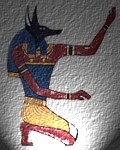 Anubis:
Description: Jackal-headed god of the underworld (because jackals often hang around fresh graves), of mummification, and of judgement; patron of embalmers, healers and surgeons
Titles/Names: Opener of the Ways of the North; Anpu; Khenty- Imentiu (Chief of the Westerners - tied to the belief that the Land of the Dead lay to the west)
Attributes: Balance (with heart and feather)
Sacred Animal: Dog or Jackal
Strictures: Desecration of the dead (Major)
Miracles: Cloak (p. 39); Confession (p. 39); Empathy (p. 42); Expose (p. 43); Exorcism (p. 44); Last Rites (p. 48); Lay on Hands (p. 49); Nightvision; Protection (p. 53); Word o' Honor (p. 61)
Gifts: Longevity (p. 70); Restoration (p. 72)
Hexes: Necromancer (p. 56); Playing Possum (p. 60); Reanimate (p. 63)
Notes: Illegitimate son of a fling between Nephthys (wife of Set) and Osiris; invented mummification to bring Osiris back to life after Set slew him in rage; responsible for guiding the dead to the afterlife, and for weighing the hearts of the deceased against a feather (the Ma'at) - If the heart is heavier, it is cast to Ammit, the Devourer. Not on good terms with Set. Once seen as the god of the underworld, but was supplanted by Osiris in this role in later Egyptian theology.
Anubis:
Description: Jackal-headed god of the underworld (because jackals often hang around fresh graves), of mummification, and of judgement; patron of embalmers, healers and surgeons
Titles/Names: Opener of the Ways of the North; Anpu; Khenty- Imentiu (Chief of the Westerners - tied to the belief that the Land of the Dead lay to the west)
Attributes: Balance (with heart and feather)
Sacred Animal: Dog or Jackal
Strictures: Desecration of the dead (Major)
Miracles: Cloak (p. 39); Confession (p. 39); Empathy (p. 42); Expose (p. 43); Exorcism (p. 44); Last Rites (p. 48); Lay on Hands (p. 49); Nightvision; Protection (p. 53); Word o' Honor (p. 61)
Gifts: Longevity (p. 70); Restoration (p. 72)
Hexes: Necromancer (p. 56); Playing Possum (p. 60); Reanimate (p. 63)
Notes: Illegitimate son of a fling between Nephthys (wife of Set) and Osiris; invented mummification to bring Osiris back to life after Set slew him in rage; responsible for guiding the dead to the afterlife, and for weighing the hearts of the deceased against a feather (the Ma'at) - If the heart is heavier, it is cast to Ammit, the Devourer. Not on good terms with Set. Once seen as the god of the underworld, but was supplanted by Osiris in this role in later Egyptian theology.
|
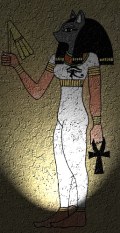 Bast
Description: Cat-headed goddess of crops (because cats eat mice) and cats (of course); also seen as a protector-goddess
Attributes: "Eye of Ra" worn about neck; sistrum (holy rattle)
Titles/Names: Lady of the East; Eye of Ra; Lady of Ointments; She Who Devours; Bastet; Ubasti; Pakht
Sacred Animal: Cats (of all types)
Miracles: Armor o' Righteousness (p. 35); Bless Crops (p. 36); Cloak (p. 39); Nightvision; Protection (p. 53); Safekeeping (p. 54); Sentinel (p. 55)
Gifts: Guardian Angel (p. 69); Hardy (p. 69)
Notes: Center of worship: Bubastis
Bast
Description: Cat-headed goddess of crops (because cats eat mice) and cats (of course); also seen as a protector-goddess
Attributes: "Eye of Ra" worn about neck; sistrum (holy rattle)
Titles/Names: Lady of the East; Eye of Ra; Lady of Ointments; She Who Devours; Bastet; Ubasti; Pakht
Sacred Animal: Cats (of all types)
Miracles: Armor o' Righteousness (p. 35); Bless Crops (p. 36); Cloak (p. 39); Nightvision; Protection (p. 53); Safekeeping (p. 54); Sentinel (p. 55)
Gifts: Guardian Angel (p. 69); Hardy (p. 69)
Notes: Center of worship: Bubastis
|
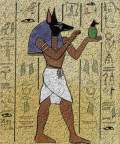 Duamutef
Description: Dog-headed protector of the stomach
Attributes: Usually depicted on the stopper of the canopic jar used to contain the stomach of a mummy.
Sacred Animal: Dog
Strictures: Tampering with Canopic Jars (Mortal)
Miracles: Grace (p. 44); Viscera
Gifts: Hardy (p. 69); Vitality (p. 73)
Hexes: Hunger Pangs (p. 50)
Notes: One of the four Sons of Horus entrusted with the task of guarding the viscera of mummies. In this case, Duamutef is assigned to guard the stomach. Given the extreme specialization of this post, Duamutef is not a widely celebrated or recognized god. In fact, he's often mistaken for Anubis. But, hey, not all gods and goddesses are created equal.
Duamutef
Description: Dog-headed protector of the stomach
Attributes: Usually depicted on the stopper of the canopic jar used to contain the stomach of a mummy.
Sacred Animal: Dog
Strictures: Tampering with Canopic Jars (Mortal)
Miracles: Grace (p. 44); Viscera
Gifts: Hardy (p. 69); Vitality (p. 73)
Hexes: Hunger Pangs (p. 50)
Notes: One of the four Sons of Horus entrusted with the task of guarding the viscera of mummies. In this case, Duamutef is assigned to guard the stomach. Given the extreme specialization of this post, Duamutef is not a widely celebrated or recognized god. In fact, he's often mistaken for Anubis. But, hey, not all gods and goddesses are created equal.
|
|
Geb
Description: Bearded god, worshipped in Lower Egypt; healer, provider of crops, causing earthquakes with his laughter; associated with element of earth
Attributes: Goose (on head); staff
Titles/Names: Seb, Keb
Sacred Animal: Goose
Miracles: Bless Crops (p. 36); Burrow; Feast (p. 44); Grace (p. 44); Lay on Hands (p. 49); Panacea (p. 52); Protection from Elements (Earth); Soothe (p. 57); Succor (p. 59); Wellspring (p. 60)
Gifts: Manna (p. 71)
Hexes: Earthwrack (p. 42); Geyser (p. 46); Quicksand (p. 61); Sculptor (p. 65); Vittles (p. 76)
Notes: Guided the dead through heaven, and provided them with food and drink; wed to the sky goddess Nut without permission of the sun god, Ra, causing the latter great anger.
|
 Horus
Description: Falcon-headed god of the sun
Attributes: Double crown: the crowns of upper and lower Egypt superimposed upon each other
Sacred Animal: Falcon
Miracles: Burnt Offerin' (p. 37); Illuminate (p. 47); Protection (p. 53); Strike Blind (p. 58); Wings o' Angels (p. 61)
Gifts: Charismatic (p. 68)
Notes: Son of Isis and Osiris; husband of Hathor/Sekhmet; enemy of Set; became the ruler of Egypt. Centers of Worship: Abydos (Ibdju) in Upper Egypt, Busiris (Djedu) in the Nile delta.
Horus
Description: Falcon-headed god of the sun
Attributes: Double crown: the crowns of upper and lower Egypt superimposed upon each other
Sacred Animal: Falcon
Miracles: Burnt Offerin' (p. 37); Illuminate (p. 47); Protection (p. 53); Strike Blind (p. 58); Wings o' Angels (p. 61)
Gifts: Charismatic (p. 68)
Notes: Son of Isis and Osiris; husband of Hathor/Sekhmet; enemy of Set; became the ruler of Egypt. Centers of Worship: Abydos (Ibdju) in Upper Egypt, Busiris (Djedu) in the Nile delta.
|
 Isis
Description: Most powerful goddess, depicted with throne on her head; sometimes depicted as a kite (bird) above the mummified body of Osiris; in later periods, depicted with the crown of Hathor (a sun disc - aton - framed by horns)
Titles/Names: Lady of the East; Aset; Eset
Sacred Animal: Kite (bird)
Miracles: Censure (p. 37); Lay on Hands (p. 49); Panacea (p. 52); Protection (p. 53); Protection from Elements (Magic); Reassurance (p. 53); Soothe (p. 57); Succor (p. 59)
Gifts: Restoration (p. 73); Vitality (p. 73)
Notes: Goddess of magic; also a protector goddess, and a goddess of healing
Isis
Description: Most powerful goddess, depicted with throne on her head; sometimes depicted as a kite (bird) above the mummified body of Osiris; in later periods, depicted with the crown of Hathor (a sun disc - aton - framed by horns)
Titles/Names: Lady of the East; Aset; Eset
Sacred Animal: Kite (bird)
Miracles: Censure (p. 37); Lay on Hands (p. 49); Panacea (p. 52); Protection (p. 53); Protection from Elements (Magic); Reassurance (p. 53); Soothe (p. 57); Succor (p. 59)
Gifts: Restoration (p. 73); Vitality (p. 73)
Notes: Goddess of magic; also a protector goddess, and a goddess of healing
|
|
Osiris
Description: Green-faced mummified king of the underworld and vegetation/agriculture; associated with the element of water
Attributes: Crook and Flail
Titles/Names: Usire
Miracles: Bless Crops (p. 36); Exorcism (p. 44); Feast (p. 44); Last Rites (p. 48); Nightvision; Protection (p. 53); Protection from Elements (Water); Walk on Water (p. 60); Wellspring (p. 60)
Gifts: Manna (p. 71); Restoration (p. 72); Self-Discipline (p. 72)
Hexes: Deadly Creepers (p. 40); Geyser (p. 46); Hard Water (p. 48); Necromancer (p. 50); Playing Possum (p. 60); Touch of Death (p. 74); Whirlpool (p. 77)
Notes: Husband of Isis; father of Anubis (by Nephthys) and Horus (by Isis); murdered by Set, then reassembled by Isis and mummified and brought back to "life" by Anubis, whereupon he took on the role of king of the Land of the West - the afterlife.
|
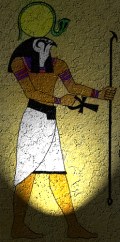 Ra
Description: Falcon-headed sun god; associated with element of fire
Titles/Names: Amon-Ra (Amen-Re)
Sacred Animal: Falcon
Miracles: Burnt Offerin' (p. 37); Calm (p. 37); Eye of Ra; Illuminate (p. 47); Nightvision; Protection (p. 53); Protection from Elements (Fire); Strike Blind (p. 58); Wings o' Angels (p. 61); Word o' Honor (p. 61)
Hexes: Wildfire (p. 77)
Notes: Originally, Ra was the chief god, but with the rise of the New Kingdom, under Theban rule, Amen was "promoted" to this role, but then blended with Ra, thereafter being known as "Amon-Ra" (or "Amen-Re"). Center of Worship: Heliopolis (near modern Cairo).
Ra
Description: Falcon-headed sun god; associated with element of fire
Titles/Names: Amon-Ra (Amen-Re)
Sacred Animal: Falcon
Miracles: Burnt Offerin' (p. 37); Calm (p. 37); Eye of Ra; Illuminate (p. 47); Nightvision; Protection (p. 53); Protection from Elements (Fire); Strike Blind (p. 58); Wings o' Angels (p. 61); Word o' Honor (p. 61)
Hexes: Wildfire (p. 77)
Notes: Originally, Ra was the chief god, but with the rise of the New Kingdom, under Theban rule, Amen was "promoted" to this role, but then blended with Ra, thereafter being known as "Amon-Ra" (or "Amen-Re"). Center of Worship: Heliopolis (near modern Cairo).
|
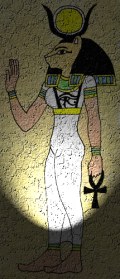 Sekhmet/Hathor
Description: As Sekhmet: Lioness-headed goddess of destruction; As Hathor: cow-headed goddess (or a woman depicted with the horns of a cow) of motherhood and fertility
Titles/Names: (As Sekhmet:) The Destroyer; Eye of Ra; (As Hathor:) Athyr; Lady of the West
Sacred Animal: Lion; Cow
Miracles: Dervish (p. 41); Nightvision; Retribution (p. 54); Smite (p. 55); Spiritual Backhand (p. 58); Wrath (p. 62)
Gifts: Lion-Hearted (p. 70); Spiritual Giant (p. 72)
Notes: Hathor took the form of Sekhmet to go out to destroy humanity in the service of Ra, but was swayed from this task when Thoth concocted a potion to make her drunk; shares the title of "Eye of Ra" with Bast - Where Bast is associated with the sun as keeper of the "Eye of Ra", Sekhmet is associated with the moon. Centers of worship: Thebes and Dandarah.
Sekhmet/Hathor
Description: As Sekhmet: Lioness-headed goddess of destruction; As Hathor: cow-headed goddess (or a woman depicted with the horns of a cow) of motherhood and fertility
Titles/Names: (As Sekhmet:) The Destroyer; Eye of Ra; (As Hathor:) Athyr; Lady of the West
Sacred Animal: Lion; Cow
Miracles: Dervish (p. 41); Nightvision; Retribution (p. 54); Smite (p. 55); Spiritual Backhand (p. 58); Wrath (p. 62)
Gifts: Lion-Hearted (p. 70); Spiritual Giant (p. 72)
Notes: Hathor took the form of Sekhmet to go out to destroy humanity in the service of Ra, but was swayed from this task when Thoth concocted a potion to make her drunk; shares the title of "Eye of Ra" with Bast - Where Bast is associated with the sun as keeper of the "Eye of Ra", Sekhmet is associated with the moon. Centers of worship: Thebes and Dandarah.
|
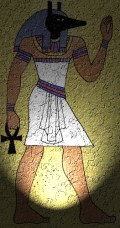 Set
Description: God of storms, chaos and the desert; depicted as a man with the head of a (presently) unknown animal, with an elongated snout and upright, rectangular ears
Titles/Names: Seth; Setekh; Setesh; Seti; Sutekh; Setech; Sutech; Lord of the Northern Sky
Sacred Animals: Crocodile; Desert Oryx; Hippopotamus; Serpent; Wild Boar
Miracles: Burrow; Calm (p. 37); Call Lightning; Nightvision; Protection (p. 53); Protection from Elements (Storms); Retribution (p. 54); Smite (p. 55); Snake Handlin' (p. 55); Strike Blind (p. 58)
Hexes: Black Lightnin' (p. 36); Nightmare Realm (p. 56); Sandstorm (p. 64); Thunderclap (p. 73)
Strictures: The eating of pork is forbidden in the Cult of Set (Minor Sin)
Notes: Set is often considered to be an "evil" god, but this is not necessarily so, though he is a particularly harsh one, and is responsible for murdering Osiris twice. It is quite possible to be a Blessed of Set and be just as much a hero as a follower of any of the other Egyptian gods - or just as much a villain. Center of Worship: Ombos in Upper Egypt.
Set
Description: God of storms, chaos and the desert; depicted as a man with the head of a (presently) unknown animal, with an elongated snout and upright, rectangular ears
Titles/Names: Seth; Setekh; Setesh; Seti; Sutekh; Setech; Sutech; Lord of the Northern Sky
Sacred Animals: Crocodile; Desert Oryx; Hippopotamus; Serpent; Wild Boar
Miracles: Burrow; Calm (p. 37); Call Lightning; Nightvision; Protection (p. 53); Protection from Elements (Storms); Retribution (p. 54); Smite (p. 55); Snake Handlin' (p. 55); Strike Blind (p. 58)
Hexes: Black Lightnin' (p. 36); Nightmare Realm (p. 56); Sandstorm (p. 64); Thunderclap (p. 73)
Strictures: The eating of pork is forbidden in the Cult of Set (Minor Sin)
Notes: Set is often considered to be an "evil" god, but this is not necessarily so, though he is a particularly harsh one, and is responsible for murdering Osiris twice. It is quite possible to be a Blessed of Set and be just as much a hero as a follower of any of the other Egyptian gods - or just as much a villain. Center of Worship: Ombos in Upper Egypt.
|
|
Shu and Tefnut
Description: Lion god and goddess of the sky - Shu is associated with the light of the sun, the hot and dry air of mid-day, and the winds of the north, often depicted as a man with a feather or hind-quarters of a lion on his head; Tefnut is associated with damp, cool air, rain and gentle winds, and is depicted as a lion-headed woman, or as a lioness. They are worshipped together, believed to share a single soul; associated with element of air
Sacred Animal: Lion
Miracles: Burnt Offerin' (p. 37); Call Lightning; Calm (p. 37); Illuminate (p. 47); Protection from Elements (Air/Lightning); Wings o' Angels (p. 61)
Hexes: Air Bubble (p. 34); Sandstorm (p. 64); Sirocco (p. 66); (Texas) Twister (p. 73); Thunderclap (p. 73)
|
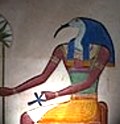 Thoth
Description: Ibis-headed god of wisdom, mathematics, writing and the moon; sometimes depicted as a baboon; arbiter and scribe of the gods
Titles/Names: Thot; Thout; Djhowtey; Djehuti; Tehuti; Zehuti
Sacred Animals: Ibis, Baboon
Miracles: Babble On (p. 35); Interpret Vision (p. 48); Mediate (p. 50); Medicine; Parlay (p. 52); Scribe; Solace (p. 57); Solomon's Advice (p. 57); Word o' Honor (p. 61)
Gifts: Insight (p. 69); Portents (p. 71); Prophesy (p. 71); Tongues (p. 73); Wisdom (p. 73)
Notes: Once collected all the wisdom of the world in the Book of Thoth, and placed it in a series of chests, sunk them in the nile, and had them guarded by scorpions and a large serpent. Also shown recording the results of Anubis' testing of the heart of the deceased against the Ma'at (feather of truth). Center of worship was Hermopolis (Khmunu) in the Nile delta region.
Thoth
Description: Ibis-headed god of wisdom, mathematics, writing and the moon; sometimes depicted as a baboon; arbiter and scribe of the gods
Titles/Names: Thot; Thout; Djhowtey; Djehuti; Tehuti; Zehuti
Sacred Animals: Ibis, Baboon
Miracles: Babble On (p. 35); Interpret Vision (p. 48); Mediate (p. 50); Medicine; Parlay (p. 52); Scribe; Solace (p. 57); Solomon's Advice (p. 57); Word o' Honor (p. 61)
Gifts: Insight (p. 69); Portents (p. 71); Prophesy (p. 71); Tongues (p. 73); Wisdom (p. 73)
Notes: Once collected all the wisdom of the world in the Book of Thoth, and placed it in a series of chests, sunk them in the nile, and had them guarded by scorpions and a large serpent. Also shown recording the results of Anubis' testing of the heart of the deceased against the Ma'at (feather of truth). Center of worship was Hermopolis (Khmunu) in the Nile delta region.
|
|
Wapwawet
Description: Dog-headed war god (easily confused with Anubis in appearance); avenger of Osiris
Titles/Names: Upuaut
Attributes: Depicted carrying a battle standard
Sacred Animals: Jackal, Dog
Miracles: Battle Hymn (p. 35); Dervish (p. 41); Endure (p. 42); Protection from Elements (Archaic Missile Weapons); Retribution (p. 54); Sentinel (p. 55); Smite (p. 55); Wrath (p. 62)
Gifts: Guardian Angel (p. 69); Hardy (p. 69); Lion-Hearted (p. 70); Refuge o' Faith (p. 71); Spiritual Giant (p. 72)
Notes: War god of Asyut in Middle Egypt, with no known mythos built up around him - essentially an icon for warriors.
|




 Anubis:
Anubis:
 Bast
Bast
 Duamutef
Duamutef
 Horus
Horus
 Isis
Isis
 Ra
Ra
 Sekhmet/Hathor
Sekhmet/Hathor
 Set
Set
 Thoth
Thoth
